
Following a win at its debut race, the GR Yaris and ROOKIE Racing team ran into trouble after a crash during a practice run resulting in damage to the vehicle. This story is about how the team came together to recover.

SUGO’s “monster” attacks ROOKIE Racing
It is often said that “a monster lives in the circuit” because of how much drama the Sportsland SUGO racing course creates. Located in Miyagi Prefecture, it is known amongst Japanese circuits for being narrow. That “narrow monster” launched its attack on ROOKIE Racing at the “Super Taikyu SUGO 3 Hours Race” held from Friday, October 9th to Sunday, October 11th.
It was the first day and the free running had just started when, at 9:38 am, the pits heard the news that ROOKIE Racing team driver Masahiro Sasaki had crashed on the third corner.
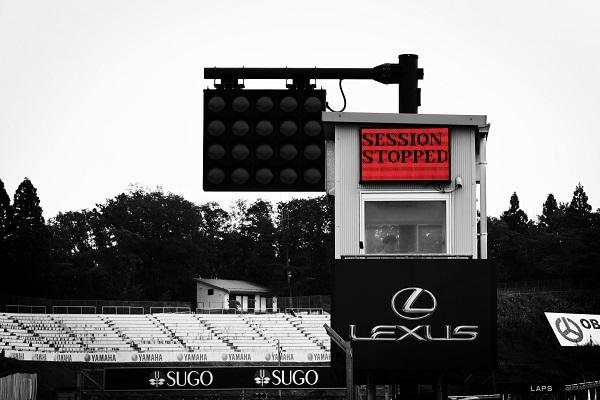
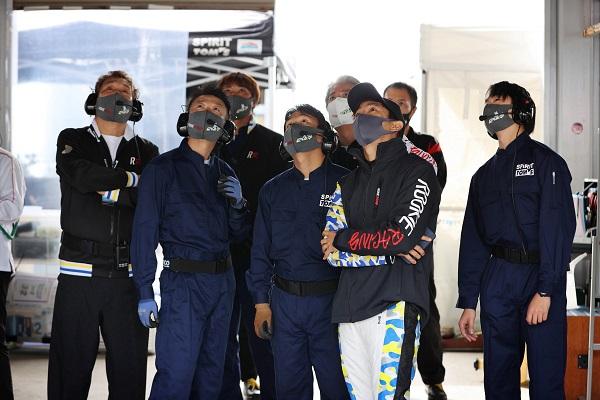
At the same time, a fan in the bleachers tweeted the following, including a photo:
“GR Yaris went off track…. Will it be able to race [again] today? I came to SUGO for the sole purpose of seeing this at the race.”
The damaged car returned to the pits at 10:05 a.m. The driver, Sasaki, fortunately wasn’t hurt. The front of the car was a different story. In the previous “Fuji 24 Hours Race”, there had been a spare car since it runs for 24 hours; however, for SUGO, none had been prepared.
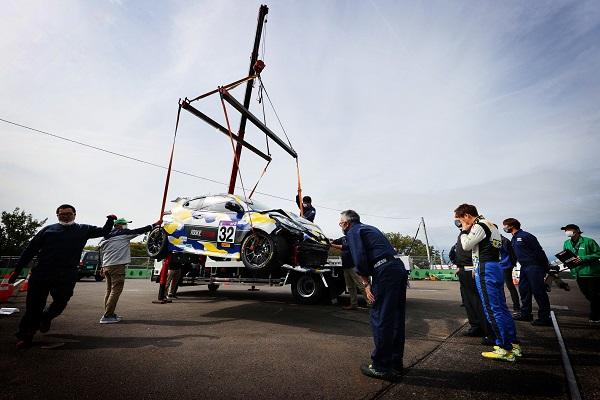
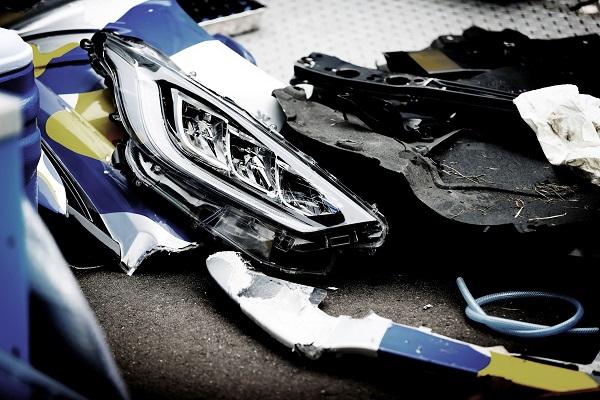
After such an accident, a typical team would probably have given up on driving the car in the afternoon, instead using the time to start repairs in order for the car to be ready in time for the preliminaries scheduled for the next day. But not for the ROOKIE Racing team! Despite the recent victory at Fuji, as a brand-new car, the GR Yaris was still having its potential in racing tested. Those tests needed to be conducted, if possible, via the finals.
“Let’s get the car going again by the afternoon free practice!!”
The team was determined to have the GR Yaris repaired and operable by the afternoon free practice. However, they still had their own race against time: they had 3.5 hours to get it all done. Seeing the situation of the vehicle immediately after it had returned to the pits, Chief Mechanic Takashi Mitsuzuka, the supervisor on site, said, “We can fix this!” Although only a minimal amount of spare parts were available, his long years of experience helped him clearly see what the finished product would look like after 3.5 hours of repair work.
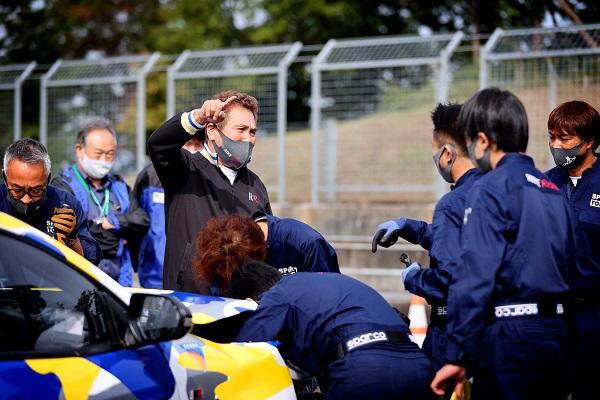
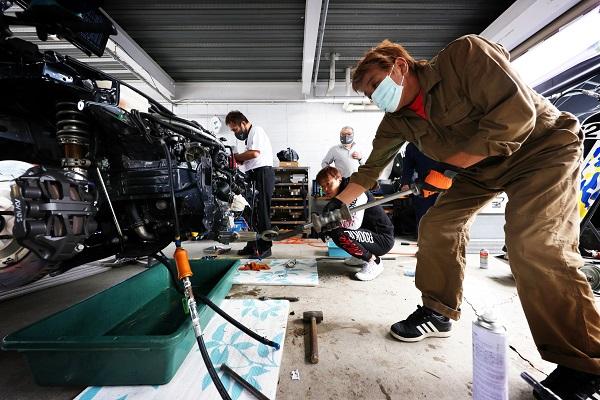
First, Mitsuzuka called a local friend who was a master panel beater. The friend was willing to come immediately, pausing his regularly scheduled work, and he arrived at the pits in 15 minutes. Immediately, he started pounding on the car with a hammer. Without any parts, equipment or drawings, he started repairing the framework of the car. To others around him, he looked like he was having a conversation, but one where the other person, the car, couldn’t speak back.
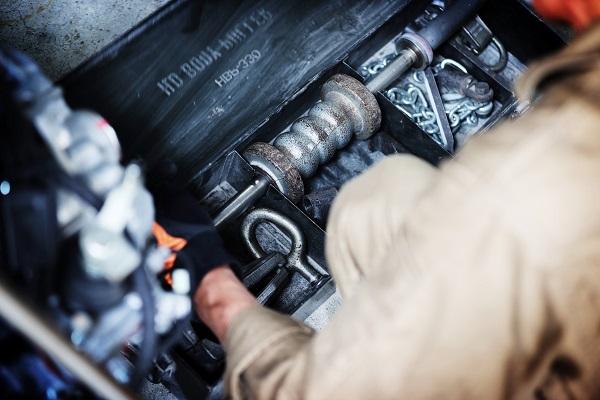
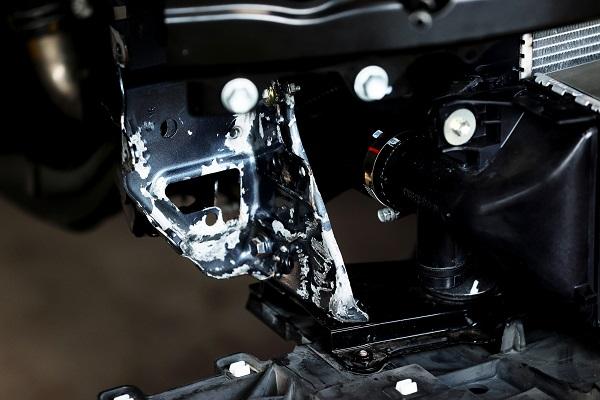
While the body work was being done, Akio Toyoda, or Morizo, talked to the driver, Sasaki, who seemed devastated. Sasaki was not only Morizo’s teammate, but also one of his driving teachers after the passing of Hiromu Naruse, former master test driver at Toyota and Akio’s driving mentor, in 2010. Akio took a moment to reassure Sasaki, saying:
“Seeing you crash reminded me that you’re not superman!
Besides, we’re going to be fine. (Kazuya) Oshima is already driving a new GR Yaris here to support us tomorrow, and we can get new parts.”
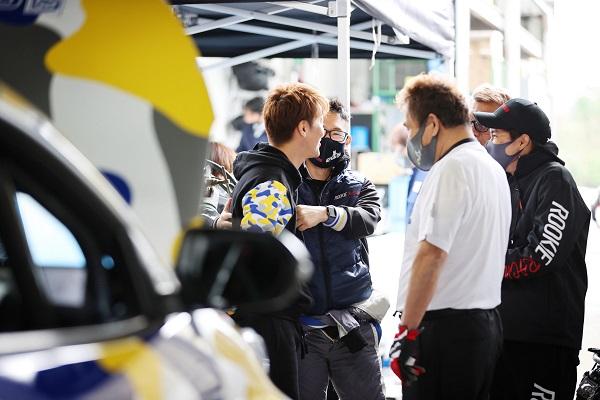
That pep talk from Akio, along with his other teammates encouraging him in their own ways, brought a smile back to Sasaki’s face.
In the pits, Mitsuzuka’s zealous work was also a source of inspiration, leading the others to stand up and contribute in any way they could. Mechanics started working from where they were waiting, and Sasaki also joined. Then, the rest of the teammates there began to help as well. To support the mechanics and order parts, one of the GAZOO Racing (GR) engineers communicated with headquarters, and worked to secure the parts from Miyagi Toyota (Iwanuma Branch).
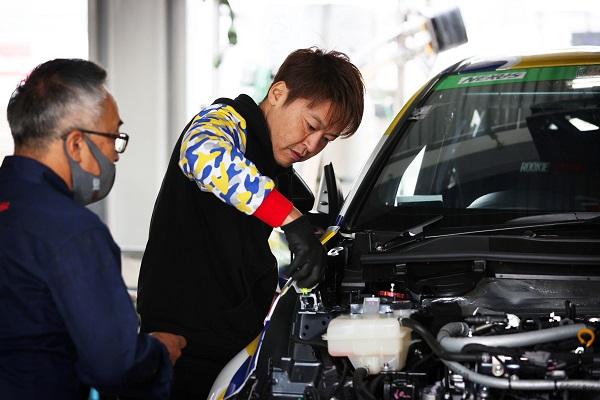
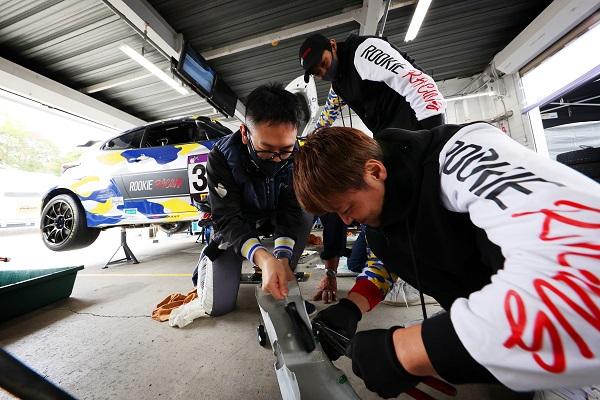
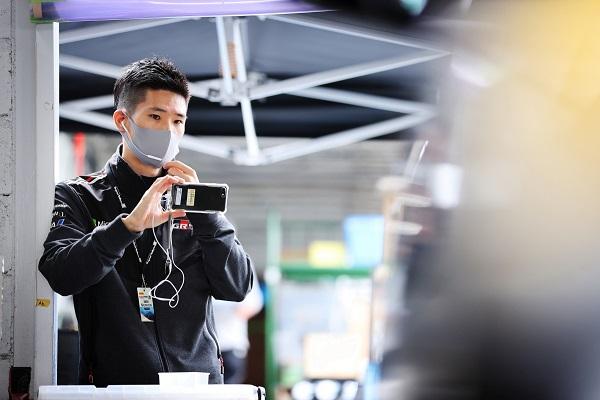
Slowly but surely the car was returning to its original form, but not without some rigorous pushing and pulling. By 11:28 a.m., the radiator was put in place. Then, at 11:37 a.m., the headlamps were reattached. Once reattached, the physical damage was no longer strikingly visible. Finally, with a sigh of relief, the engine turned over at 12:58 p.m. The team had won its race against time, the both long and short 3.5 hours they had.
Each and every person accomplished the mission, achieving the same goal
During the repairs, Morizo had been standing in the pits, observing how the team worked closely during this entire process.
He said, “I was the only one who stood there, unable to help while mechanics, engineers, drivers and others did what they each could do to support the site supervisor and master. It was so inspiring!”
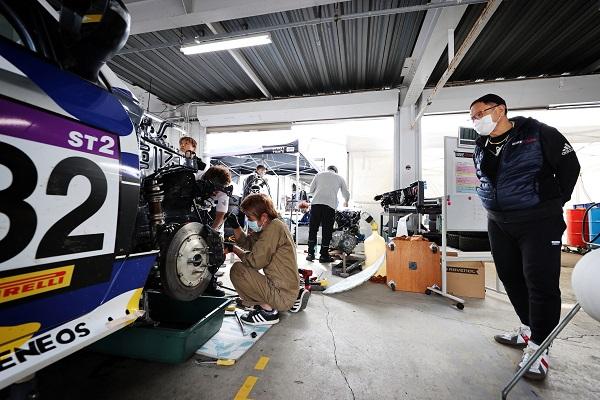
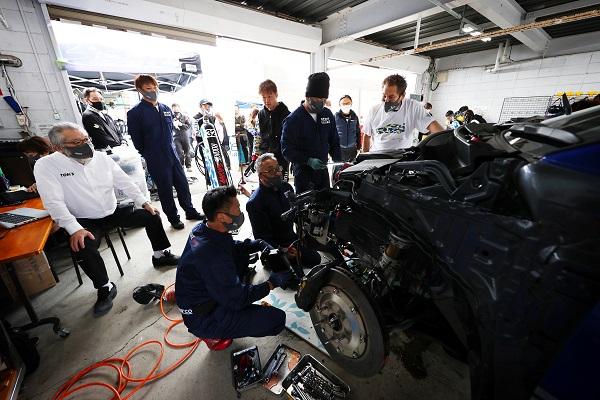
Not only did he witness history in the making, but he also realized how amazing the team had become.
One GR engineer was heard commenting, “How did [Mitsuzuka] know that he could fix it? It made me realize the gap in skills between myself and a professional.” The comment showed the need for and embodiment of the types of true skills that are backed up through a focus on “genchi genbutsu” (go and see the site to understand what is happening) and cultivating human talents, capable of surpassing computer-based technology. This was something that one could not have felt just sitting at a desk in an office. Things happen at the genba (where work takes place)…they say that’s what always matters most.
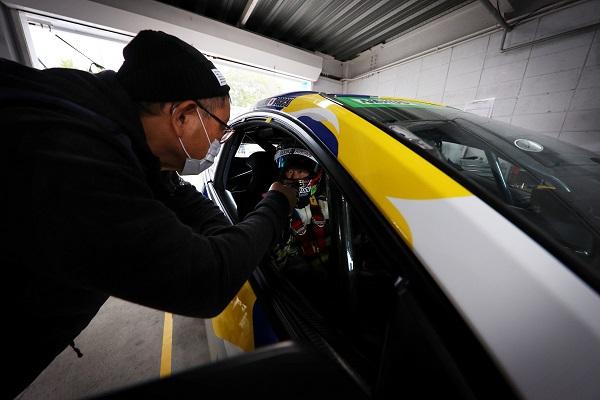
Noriaki Mitsuhashi, the photographer on site that day, made the following comment:
“I saw the team grow even stronger. All these people with different backgrounds and jobs coming together with their own missions to achieve the same goal. That’s ROOKIE Racing.”
From the outside, this might have seemed like a typical racing accident and normal repair process, but, from the inside, it was an invaluable experience and team-building exercise that led ROOKIE Racing to feel the true essence of uniting “together as one,” something that Morizo had envisioned and hoped for.
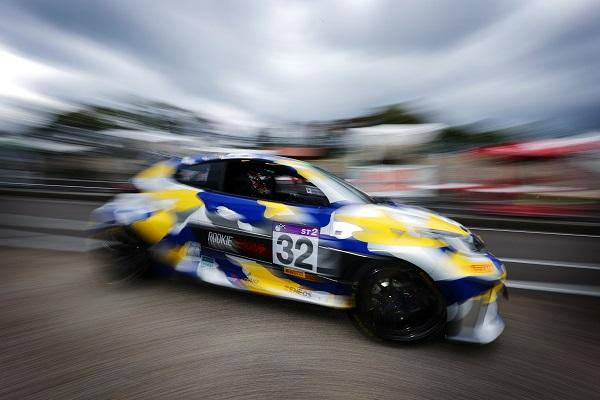
At 1:30 p.m., the previously damaged GR Yaris made its return to enter the second round of free running with the other cars, as if nothing had happened.
Then, the same fan who tweeted earlier, posted a video of GR Yaris racing, stating, “Congratulations! GR Yaris is back!”
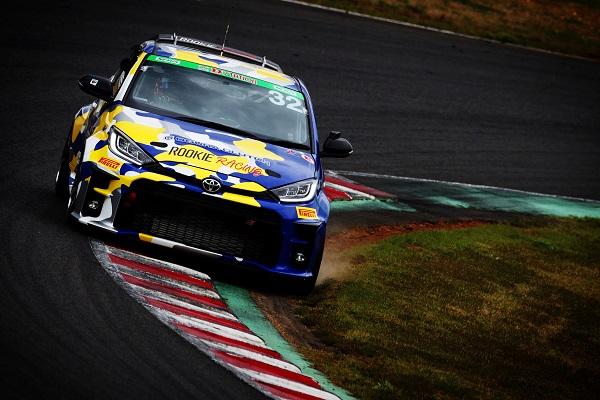
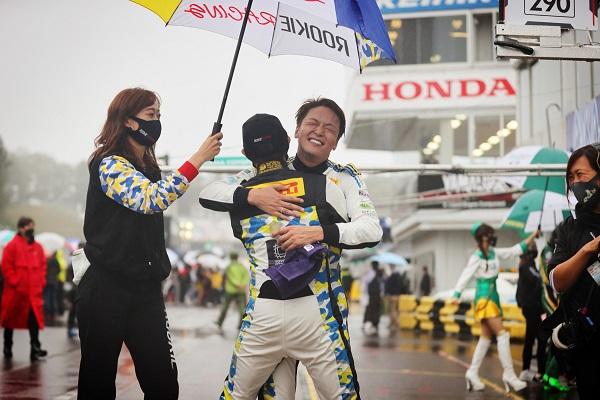
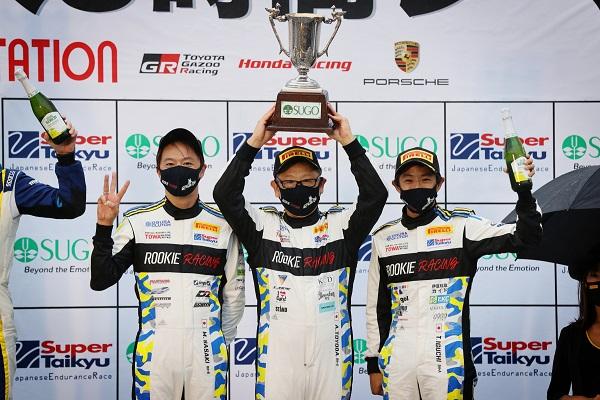
Shinya Yamamoto is an automotive analyst who started his career at an automobile magazine after working for an automaker and a tuning maker. From becoming a freelancer in 2013, he has since continued his work with a motto of understanding both those who make the product and those who use it in order to explain things in an easy and compelling way.
Born in Ise city, Mie prefecture in 1976, Noriaki Mitsuhashi is a photographer who now serves as an exclusive photographer for ROOKIE Racing. He has visited various circuits around the world to take photographs at such races as Formula 1, 24 Hours of Le Mans, 24 Hours Nürburgring, Super Formula, Super GT, and Super Taikyu Series.

